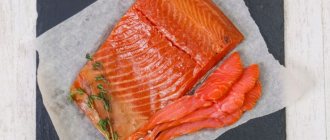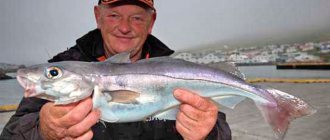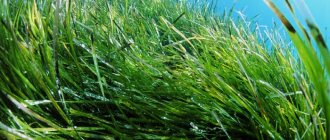The octopus, the most famous representative of cephalopods, has a short, soft body, oval at the back. The mouth opening is located where its tentacles meet, and the anal opening opens under the mantle. The robe resembles a wrinkled leather bag. The octopus's mouth is equipped with two powerful jaws, similar to the beak of a parrot. There is a grater in the throat that helps to grind food. The head bears eight long tentacles - “arms”.
In males, one tentacle is modified into a copulatory organ. The “hands” are connected to each other by a thin membrane and equipped with suction cups. On all eight tentacles of an adult octopus there are about 2000 of them, each of which has a holding force of about 100 g. On each “arm” there are up to 10 thousand taste buds that determine whether an object is edible or inedible. The eyes are large, with a lens similar to that of a human. The pupil is rectangular. There is no hearing. The octopus breathes through gills, but without harming its health, it can be out of water for a short time. The brain is highly developed and has a rudimentary cortex. The octopus has three hearts: one (the main one) drives blue blood throughout the body, and the other two - gills - push the blood through the gills.
The common octopus has the ability to change color to adapt to its environment. This is explained by the presence in his skin of cells with various pigments that, under the influence of impulses from the central nervous system, can stretch or contract depending on the perception of the senses. The usual color is brown. If the octopus is scared, it turns white; if it is angry, it turns red.
On average up to 90 cm in length (including tentacles), the maximum length in males is up to 1.3 m, in females - up to 1.2 m. Weighs from 4.5 to 7 kg, maximum weight 10 kg. Lifespan: Rarely exceeds 4 years, average 12-24 months.
It lives in all tropical, subtropical seas and oceans (with a salinity of at least 30%), from shallow water to a depth of 100-150 m. It prefers rocky coastal zones, looking for caves and crevices in the rocks for habitat. It is eaten by dolphins, sea lions, whales, seals, moray eels, eels, sharks, and birds. The octopus itself is a predator, hunting while sitting in ambush. Eats mollusks, snails, crustaceans, fish, plankton. The common octopus captures prey with all eight tentacles, and bites the victim with its beak, holding it with its suction cups. In this case, the poison of the salivary glands from the throat and mouth enters the wound.
Chemical composition of octopus
When eating seafood, the body is saturated with proteins, essential fatty acids, and a number of vitamins and minerals. Octopus meat can be used in the diet of people who are watching their calorie intake. It is considered dietary.
100 g of product contains:
- 14.9 g protein;
- 1 g fat;
- 2.2 g carbohydrates;
- 1.6 g of ash substances.
Ingestion of 100 g of shellfish provides 20% of the daily protein requirement. The specified seafood is a source of:
- vitamins C, K, E, A, PP, group B;
- minerals (iron, calcium, magnesium, phosphorus, zinc, potassium, sodium, selenium, copper, manganese, sulfur).
100 g contains 48 mg of cholesterol. You can appreciate the benefits of shellfish by knowing that when they are consumed, the body receives essential amino acids:
- phenylalanine;
- tryptophan;
- threonine;
- methionine;
- lysine;
- leucine;
- isoleucine;
- histidine;
- valine;
- arginine
The composition contains saturated and unsaturated fatty acids, essential amino acids. They are involved in metabolism. There will be benefits even with periodic inclusion of shellfish in the diet.
What are the benefits of octopus?
When eating octopus dishes, the body receives the necessary acids, vitamins, and minerals. Shellfish are an excellent source of protein, so their benefits cannot be overestimated. When consuming 100 g of meat, the body receives more than 800% of the daily requirement of vitamin B12. This amount provides 80% of the need for selenium, 50% for iron and copper.
There will be benefits even with occasional consumption of seafood. But their regular inclusion in the diet helps prevent a deficiency of substances necessary for the body. Cephalopods are allowed even for diabetics; their consumption does not affect blood sugar levels.
Octopuses are a source of vitamins, minerals, amino acids and other substances that have a positive effect on the functioning of many organs and systems.
Omega-3 acids, which seafood is rich in, control the functioning of the immune, reproductive, and cardiovascular systems. The benefit is that their regular use reduces the likelihood of developing atherosclerosis, hypertension, and thrombosis. People whose diet includes octopus and other seafood rarely experience heart and vascular diseases.
Under the influence of substances contained in these products:
- prevents the formation of cholesterol plaques;
- the elasticity and strength of vascular walls increases;
- calcium metabolism is regulated;
- joint condition improves;
- the body's resistance to infections increases;
- the process of transmitting impulses between neurons is stimulated;
- Concentration increases and memory improves.
The benefits of octopus for the body become visible when it is regularly included in the menu.
Attention! People whose diet contains large quantities of seafood look healthy. They are less likely to suffer from cardiovascular diseases, osteoporosis, and brain disorders.
What are the benefits of octopus for men?
Shellfish meat has a positive effect on overall health. The inclusion of a large amount of B vitamins, potassium, and fatty acids helps prevent heart attacks, strokes and other diseases associated with disruption of the heart and blood vessels. It normalizes the state of the nervous system, preventing the negative effects of stress on the body.
We recommend reading: Beneficial properties and uses of kukui oil
The benefits are most noticeable in men suffering from sleep disorders and depressive disorders. Substances contained in seafood have a positive effect on the nervous system.
Thanks to the inclusion of zinc and selenium, the functioning of the hormonal system improves, and testosterone begins to be produced more actively. The combination of B vitamins and these minerals enhances potency, prevents the development of erectile dysfunction and ensures proper functioning of the prostate gland.
This is not all the benefits of octopus meat for men's health. It is believed that regular inclusion of foods with Omega-3 acids in the diet reduces the risk of developing prostate and intestinal cancer.
What are the benefits of octopus for women?
Seafood improves the functioning of many systems and organs. Women need to add them to their diet just like men.
Octopus meat, when consumed regularly, normalizes the functioning of the nervous and cardiovascular systems. In old age, women whose diet included seafood may not be afraid of osteoporosis. The benefit of octopus is that the substances contained in its meat prevent the leaching of calcium from the bones.
Women are recommended to eat octopuses to reduce the risk of developing diseases of the cardiovascular and nervous systems, osteoporosis and the appearance of malignant tumors
Eating seafood triggers the production of prostaglandins in the body. They have an anti-inflammatory effect and prevent collagen destruction. The benefits are visible to the naked eye. The skin of octopus lovers will be smooth, without acne or pimples.
According to research, adding foods rich in Omega-3 acids to your diet reduces the likelihood of developing breast and ovarian cancer by 35%.
Octopus harm
Having learned about the benefits of marine meat, many begin to include it in their diet. But before buying octopuses, you should make sure that they are harmless. The greatest danger is posed by mercury compounds that may be contained in meat. They cause poisoning. An overdose of mercury can even lead to death.
Important! When purchasing, it is advisable to check the availability of certificates and conclusions from the sanitary and epidemiological station.
You need to monitor the freshness of seafood. If not frozen, they will spoil quickly. There will be no benefit from eating such octopuses. Even after heat treatment, they can cause poisoning.
Rules for selection and preparation
There are a number of rules that allow you to choose really high-quality fresh octopus on store shelves:
- Eyes. The eyeballs should be clear, clear and slightly protruding.
- Appearance. The presence of dark or white spots on the skin and tentacles is a sign of bacterial or fungal infection. It is also unacceptable to have tears or tears in the covers of marine life.
- Size. The larger the octopus, the juicier and tastier its meat, but the higher the likely concentration of mercury and other heavy metals.
When purchasing frozen octopus, you need to pay special attention to the appearance of the ice. The presence of white specks or crushed pieces of ice indicates that the product has been frozen several times.
An equally important role is given to the proper preparation of octopus. The main culinary and nutritional value is provided by the tentacles of the seafood. To give them a soft consistency and juiciness, you should beat them first. In this case, small octopuses are eaten whole.
The most useful and simplest way is to boil octopus meat. Before cooking, the seafood is poured with cold water for 15-20 minutes, then placed on the fire. After boiling, the meat simmers over low heat for another 20-25 minutes. The dish is ready.
Less healthy options are: marinated, salted, fried octopus, and also baked in the oven.
There are a number of tricks and rules regarding the selection and preparation of octopus that should be taken into account in order to obtain a high-quality, tasty and healthy product.
Contraindications for octopus
Before including seafood in your daily diet, you must make sure there are no contraindications. There will be no benefit from octopus tentacles if they are consumed by a person who is prohibited from eating marine meat.
Contraindications include:
- individual intolerance;
- seafood allergies;
- ulcerative lesions of the gastrointestinal tract;
- diseases of the stomach, intestines, pancreas.
In case of these pathologies, it is better to refuse meat from octopus and other marine inhabitants. Their use can provoke a deterioration of the condition, an exacerbation of allergic reactions; in this case there will be no benefit.
Rules for eating octopus
It is recommended to include octopus meat in the menu only after heat treatment. Cephalopods can be consumed raw when they have just been caught. Otherwise, there is a high risk of poisoning.
Nutritionists recommend including octopus in the menu 2-3 times a week, 200-300 g each. This amount is enough to obtain all the necessary substances and achieve maximum benefits.
To get the maximum benefit from cephalopods, it is recommended to include them in the diet every 2-3 days; eating 200-300 g per day is enough.
Before cooking, shellfish meat must be defrosted at room temperature and washed to remove mucus, cut the carcass, removing the eyes, ink sac and beak. From large specimens the skin should be scraped off with a knife; from small octopuses it is removed after heat treatment.
Boil, stew or fry these shellfish for about 7-10 minutes. Longer heat treatment leads to the fact that the meat becomes tough, although the benefits from it will be no less.
general characteristics
Octopuses are quite ancient creatures. They have an unusual structure. Their body is soft, short, oval-shaped. The skeleton is missing. They have about 8 legs - tentacles (hence the name), on which suction cups are located. The retina of the eyes is directed outward. At the junction of the tentacles there is a mouth opening with two jaws.
It is worth noting that the mollusk’s brain is quite developed . These creatures are able to distinguish sounds, geometric shapes, and they have a good memory. They have three hearts. Another feature they have is blue blood.
On average, mollusks live for about three years . They live in seas and oceans with a certain salt composition.
Octopus is a popular food in many countries. The cooked shellfish meat is creamy in color, tastes very juicy and tender, but at the same time low in calories.
Applications of octopus
Small and large shellfish can be pickled, boiled, baked, stewed, fried. They go well with vegetables, rice, and other seafood. You can improve the taste of the finished dish by lightly beating the meat first and adding soy sauce, olive oil or wine vinegar when cooking.
Octopus can be served as an independent dish or used as an ingredient in seafood soup or salad. This cooking method is popular:
- a washed and cleaned carcass weighing 500 g is cut into pieces;
- each part is rolled in flour;
- Place the slices in a frying pan with hot oil and fry for 2-3 minutes;
- add 80 g of butter, 4 tbsp. to the processed meat. l. cream, 3 chopped garlic cloves, salt, spices and 100 ml of water;
- The products are mixed and left to simmer under the lid for 5 minutes.
You can serve octopus made according to this recipe with rice or vegetables.
Product history
The history of eating octopus dates back to ancient times. The delicacy gained its greatest popularity during the period of Antiquity. Large octopuses were cut into pieces, rubbed with herbs and spices, combined with dough and served in the form of a large warm pie.
In Mediterranean countries, octopuses have been the culinary leader for many years. Snacks and simple seafood dishes are a favorite food of the locals and an indispensable element of folk culinary culture.
In Spain, baking octopus tentacles with dough is especially popular. Local residents of Barcelona cannot imagine their life without delicacy. In every store you can find sets of stuffed seafood that have been heat-treated and are ready to eat. They are simply heated and served as a main course.
In Japan, they prefer to fry octopus in oil; in Polynesia, they prefer to dry it and then boil it in coconut milk or bake it in an earthen oven.
Today you won’t surprise anyone with a sandwich with octopus meat.
New ways of preparing dishes cause genuine delight. Modern cooking is busy with unusual combinations, preparing sweet octopuses, and searching for the perfect sauce for the delicacy. And each of us can make our own contribution to the history of culinary searches. Nutritional value (in grams per 100 grams of product)
| Squirrels | 15 |
| Fats | 1 |
| Carbohydrates | 2,2 |
| Water | 80,25 |
| Alimentary fiber | 0 |
| Calorie content | 82 kcal |
Vitamin composition (in milligrams per 100 grams of product)
| Choline (B4) | 65 |
| Nicotinic acid (PP) | 2,1 |
| Phylloquinone (K) | 0,0001 |
| Tocopherol (E) | 1,2 |
| Ascorbic acid (C) | 5 |
| Cyanocobalamin (B12) | 0,02 |
| Pyridoxine (B6) | 0,36 |
| Pantothenic acid (B5) | 0,5 |
| Riboflavin (B2) | 0,04 |
| Thiamine (B1) | 0,03 |
| Retinol (A) | 0,045 |
| Cobalamin (B12) | 0,02 |
| Folic acid (B9) | 0,016 |
Mineral composition (in milligrams per 100 grams of product)
| Selenium | 0,0448 |
| Manganese | 0,025 |
| Copper | 435 |
| Zinc | 1,68 |
| Iron | 5,3 |
| Phosphorus | 186 |
| Calcium | 53 |
| Magnesium | 30 |
| Sodium | 230 |
| Potassium | 350 |
| Omega-3 | 350 |









